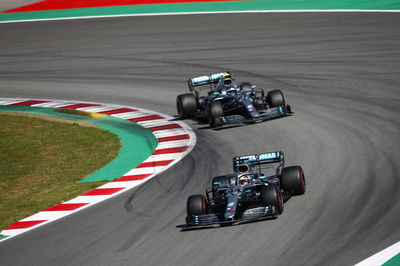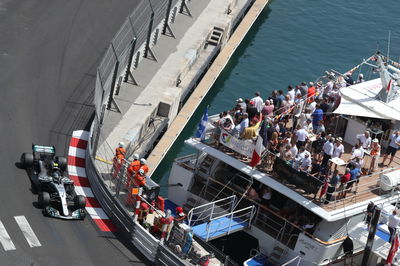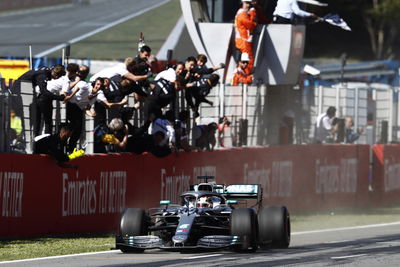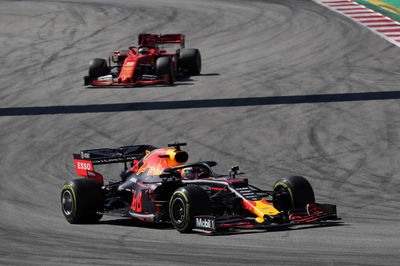Can Mercedes go one better than McLaren in 1988?
“It’s going to be 1988 all over again, isn’t it?”
After seeing Mercedes sweep to not only its fifth consecutive victory but also its fifth-straight one-two finish, the above comment made in the press conference room prior to the drivers’ arrival was made with a feeling of disbelief.
In an era where there isn’t just one team running seconds per lap faster than the rest of the field, with reliability levels now so high, and in the third year of a regulation cycle, the idea of a team emulating McLaren’s achievement from 1988 would have seemed fanciful.

“It’s going to be 1988 all over again, isn’t it?”
After seeing Mercedes sweep to not only its fifth consecutive victory but also its fifth-straight one-two finish, the above comment made in the press conference room prior to the drivers’ arrival was made with a feeling of disbelief.
In an era where there isn’t just one team running seconds per lap faster than the rest of the field, with reliability levels now so high, and in the third year of a regulation cycle, the idea of a team emulating McLaren’s achievement from 1988 would have seemed fanciful.
McLaren won 15 out of the 16 races in 1988 as Ayrton Senna and Alain Prost battled for the drivers’ championship in their first year together as teammates. The only thing that stopped McLaren was a surprise clash for Senna with lapped Williams driver Jean-Louis Schlesser at the Italian Grand Prix, giving Ferrari a surprise one-two at Monza.
Mercedes came close to matching that win rate of 94 per cent at the start of the V6 hybrid era when it was comfortably clear of the chasing pack. But even then it couldn’t manage it. In 2014, it lost out in Canada (reliability), Hungary (rain) and Belgium (after Nico Rosberg and Lewis Hamilton collided). 2015 brought three defeats to Ferrari on merit, while 2016’s clean sweep was only prevented by another Rosberg-Hamilton clash, this time in Spain, and Hamilton’s fiery demise in Malaysia.
That seemed to be the end of Mercedes’ chances of a perfect season, with Ferrari and Red Bull becoming more competitive under the revised regulations for 2017. But the German marque has again made a step, making gains, even after all this success, to make it a possibility five races into the year.
“He didn’t say that!” cried Toto Wolff when the suggestion of a perfect season was put to him after the race on Sunday, laughing it off.
“I think you need to stay humble and keep both feet on the ground. We've had five fantastic performances now, and five one-twos, but we don't take it for granted. It's not just saying it, it's really the mindset that we have.
“The next two weeks are going to be a tremendous challenge for us. We've not had the performance in Monaco in the last years. Remember how strong [Daniel] Ricciardo was last year in the Red Bull? They were in a league of their own.
“We need to take one step at a time. The next race weekend looks challenging on paper. That is massively exciting for us to go there. So let's look at the next race, which is the sixth, and try to do well there.”
But the signs are that Monaco – the team’s bogey track in recent years – could even fall the way of Mercedes.

Sector 3 in Barcelona has always been taken as a good read for how things will go in Monaco. Red Bull was rapid through the tight sector last year, and subsequently eased to the win in Monaco. This year, Mercedes was clearly fastest, with the 0.8-second gap we saw to the Ferraris on Saturday in qualifying coming almost entirely in the final sector.
While Max Verstappen identified Monaco as being a track where Red Bull could perhaps draw closer to Mercedes, even he was honest about who the team to beat there was: “I think at the moment, looking at the low-speed performance in the last sector, we are clearly not the favourite. I also don’t expect it to be like last year when we were super strong in Monaco.”
So barring anything out of the norm, that would be six out of six for Mercedes. Its car may not quite have the straight-line speed of the Ferrari, but through the corners and under acceleration, it is clearly ahead. If that trend continues, and if Ferrari cannot get to the bottom of its issues quickly enough to cut the gap, it’s hard to see where it can be beaten under normal circumstances.
Much as Wolff brushed off the idea of a perfect season being within Mercedes’ reach, so did Ferrari drivers Sebastian Vettel and Charles Leclerc. Both of them gave a one-word answer when asked if they feared Mercedes could win every race: “No.”
Team principal Mattia Binotto gave a more diplomatic reply: “ I think we will never give up and I think our ultimate objective is to do better than Barcelona. Each circuit is different and in Monaco, it is a different circuit. Our car has some strengths and certainly some weaknesses, so I think it is too early for such an assumption.”
What cost Mercedes a shot at completing a clean sweep in 2014 and 2016 were driver tensions, reliability setbacks and small but costly operational issues. The first of those three have been removed entirely; the second, very rare; and the third is something that no team can ever perfect, but arguably Mercedes has come closer than any other outfit in F1 history.
When we consider who is the greatest team in F1 history, the debate is really now down to two teams: Ferrari from 2000 to 2004; or this current Mercedes team.
But if Mercedes were to do the unthinkable and win all 21 races this year, it would end the debate for good, and go down as the greatest achievement in F1 history.












